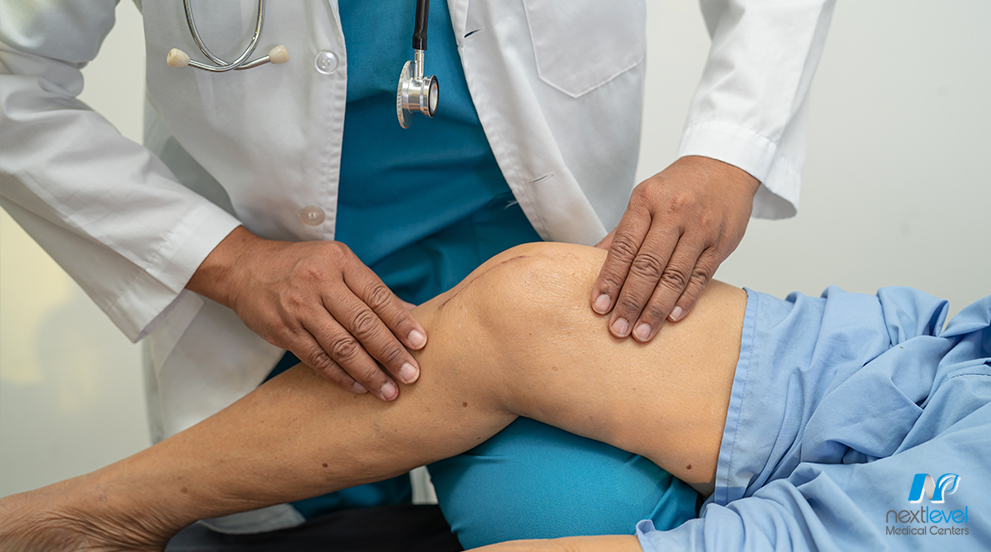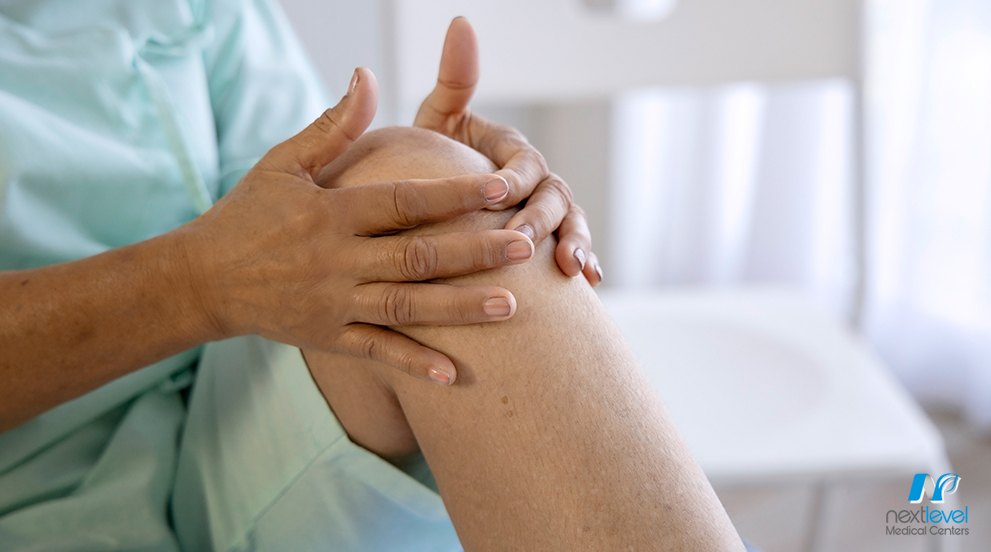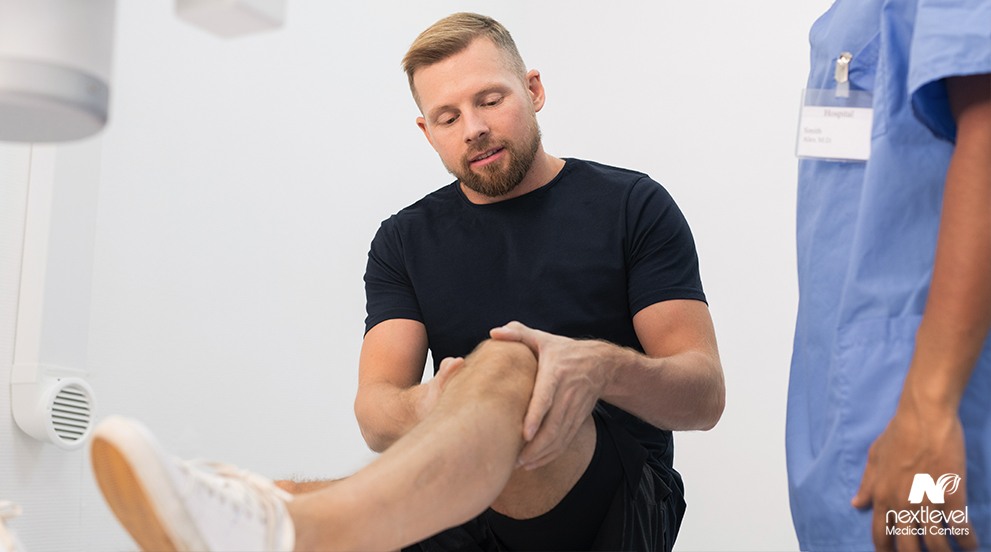

Knee pain is often caused by serious physical injury or an underlying condition. Unfortunately, chronic pain can be the least of your worries when the knee is involved. Our knees are, unfortunately, no exception to the traumas and injuries that can affect our bodies. Even more unfortunate is that our knees are critical to our ability to remain ambulatory. When our knees are damaged, we lose our ability to move, but we can usually recover from any injuries. It is only when our injuries are severe that surgical intervention becomes necessary.
Knee replacement surgery is never a first-resort treatment avenue and is usually reserved for the most severe knee issues. When knee surgery is suggested by a medical professional, it is not done lightly as there are a host of potential risks associated with the procedure. These risks make knee replacement surgery a daunting prospect and are why many fear the procedure. However, when the procedure is necessary, it is common to feel pain for some time after the fact. Most people have a question about post-surgical pain: how long does it last.
If you are investigating the recovery rates from knee replacement surgery, you have likely already undergone the procedure. However, you might be preemptively investigating because you are concerned you might need such surgery after experiencing chronic pain in the knee. While knee replacement surgery is only necessary for the most severe circumstances, it is worthy of concern if you recently experienced significant physical trauma or suffer from a chronic health condition affecting the knee. However, the need for knee replacement surgery is rare unless you have been dealing with consistent damage to your knee for an extended period.
One of the most common causes of knee replacement surgery is osteoarthritis, a chronic arthritic condition that wears away cartilage. When the cartilage of your knee is gone, it causes your bones to grind against the kneecap and cause permanent damage. Eventually, the kneecap is too damaged to be useful anymore and causes you to lose the functionality of your leg. Osteoarthritis also causes extreme pain because the bone is exposed to so much damage.

Additionally, extreme physical trauma that destroys the knee could easily warrant replacement surgery. However, the levels of damage to the bone would need to be extraordinarily high to justify a doctor suggesting such surgery to you. Ultimately, knee replacement surgery will never be the first recommendation unless you suffer a catastrophic injury. This is especially true given that knee replacement surgery is far from the simplest medical procedure and involves a fair amount of risk that might complicate your health further.
The intensity of knee replacement surgery is a major part of the long recovery period after the procedure. This recovery period usually results in a fair amount of pain as your body adjusts to the change in your anatomy and recovers from the strain of the surgery. Unfortunately, knee replacement surgery is very risky, even when necessary for your recovery.
Knee replacement surgery is seldom employed as a first resort for any injuries or illnesses affecting you. This is because the procedure itself is inherently risky and can lead to more severe consequences than a damaged knee. All surgery carries risks, and knee replacement surgery is among the riskiest since they are replacing a natural part of your anatomy with something synthetic. These risks can cost you a limb or even be fatal if not addressed as soon as they are identified. One of the biggest risks of knee replacement surgery is infection.
Infection is one of the biggest concerns of any surgical procedure. This is mainly because any surgery can cause infection if the conditions are not sterile or if there is some form of bacteria in your body that runs rampant during your recovery. Knee replacement surgery involves putting a prosthetic into a part of your body that only knew organic material since it was formed. The prosthetics themselves can cause infection since they are made of materials to which your body might react negatively.

Following your surgery, you should remain on the lookout for:
If an infection is discovered in the knee that the doctors replaced, the treatment almost always requires another surgery to correct the problem. They would remove the prosthetic to administer antibiotics and kill the infectious bacteria. Once the infection is dealt with, another surgery is performed to replace the prosthetic. However, infection is far from the only risk that can affect you after knee replacement surgery. There have been reports of blood clots in the veins of the leg or even the lungs. These clots can cause stroke or heart attacks that can be fatal if they are severe enough.
The risks associated with knee replacement surgery are high, but the procedure is often necessary. When the surgery is performed, it also causes a few side effects that do not dissipate until you have fully recovered. The biggest side effect is the pain you experience from the surgery and the newly installed prosthetic, which brings us back to the question that has led you to this article. How long does this pain last?
When you undergo knee surgery, you are going through a fairly intense procedure to have a part of your skeletal structure reinforced or replaced. A procedure like that is not pleasant and is certainly not painless by any measure of the word. However, while many surgeries and procedures tend to have a known recovery period, they are not always set in stone. Knee replacement surgery is one procedure that will have some lingering pain after the fact, but the pain does not always fade on schedule.
The main source of postoperative pain is the swelling that the healing process causes. This swelling causes the newly installed prosthesis to experience great pressure while your body adjusts to the new artificial knee. This can be extremely painful, especially since you were likely in great pain long before the surgery. This can usually lead to pain levels that are significantly higher than they might have been previously. The pain from knee replacement surgery has a lengthy lifespan compared to more conventional medical procedures.

On average, the pain is meant to last between 6 months and a year. However, there have been reports of the pain lasting past the 1-year mark, necessitating additional medical care. Immediately after the procedure, you will likely spend several days in the hospital to recover under observation. This observation period will include pain management treatment to help stifle the negative effects of the operation. Once you are discharged from the hospital, you will have to manage your pain independently.
At this stage, the pain will be far more noticeable than when you were under observation by trained medical professionals. On average, the pain will begin to fade after 3 months, but this is not always guaranteed. The real concern should arise if you still feel intense pain after 6 months after your surgery. If the pain is as intense as it was after the surgery, it can be a bad sign for your recovery. While you might want to wait it out, it is in your best interest to coordinate with your doctor to determine why the pain has persisted.
While the pain from knee replacement surgery might not fade on a schedule, it does not have to define your life. Over 90% of prosthetic knees function for 15 years after the surgery, and you can overcome the pain caused by the prosthetic installation. However, you might need to employ some pain management treatments and techniques to ensure that you can recover properly. The biggest question about these pain management techniques is what options are available to help mitigate the pain.
When dealing with chronic pain, be it from an injury or a corrective surgery, the most common tool for pain management seems to be a prescription medication. However, this is not always the best choice when recovering from surgical pain. The problem with limb damage of this nature is that it is not enough to wait for it to heal. The less we use certain parts of our body, the more they languish and atrophy, and waiting too long to start using our body parts increases the odds of atrophy. As a result, rehabilitation is one of the best tools for recovering from pain without jeopardizing the functionality of your leg.
Your doctor will likely promote activities that help you stay limber but do not put excess pressure on the prosthetic. You will also need to take care not to push yourself too soon after the surgery if you do not want to exacerbate the issue. You will likely engage in light activities such as cycling or swimming. However, the best rehabilitative treatment occurs under the supervision of a professional. Countless physical therapy specialists provide rehabilitation services that maintain the strength and integrity of your limbs and reduce pain levels.
You might also require bracing to help stabilize the knee and minimize pain. Bracing is a common treatment that, as the name suggests, involves having a medical brace placed on the afflicted limb. While several types of braces exist for this purpose, having one will only go so far in managing pain. Rehabilitative care remains the best option for helping to manage pain while not jeopardizing the recovery of your knee. Consulting with a physical therapist will allow you to draw up a plan best suited to your specific needs.

The need for rehabilitative care is also important since joint failure is already a major risk in life. However, an artificial knee is known to accelerate the risk of joint failure, and piling high-impact activities on top of the artificial knee further increases the odds. While this care is important to your recovery, you will also need to take steps to make your living conditions conducive to healing. You might want to consider:
Taking these steps helps to protect you from harming yourself further. The safer your living environment, the less likely you are to injure yourself and the less pain you will endure. Eventually, your only question will be where you can find a provider offering comprehensive rehabilitation services so you can recover properly.
Knee replacement surgery is extremely unpleasant and is only pursued when there is no other recourse for your recovery. The surgery is complicated and can result in painful side effects with no shortage of risks to your health. The pain you feel as a result of the surgery might persist for longer than you hoped, but it almost always fades eventually.
No matter what necessitated the surgery, you will still need to take care of yourself to promote recovery so you can use your prosthetic the same way you would an organic knee. More often than not, rehabilitation will be essential to your recovery. This means you need a rehabilitative provider who can tend to your needs.

We at Ortho Integrative would like to extend an invitation for that very purpose. We offer a wide array of physical therapy treatments that can help you recover from postoperative pain. Thanks to medical experts like Dr. Emmett Blahnik, we can tailor customized rehabilitation programs to help you recover from your specific injury or pain. So, if you want to recover from the pain of your surgery and you’re potentially interested in our services, consider visiting our website. Let us help you take your health to the Next Level!